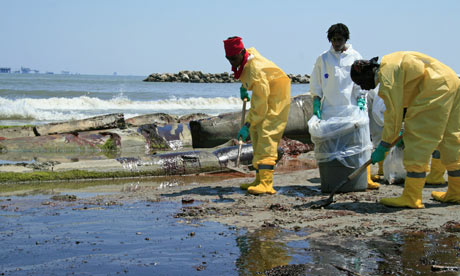Worries escalate over effect of Corexit on marine wildlife

BP faces criticism over the chemicals it is using to disperse the oil slick. Photograph: Stephane Jourdain/AFP/Getty Images
Lisa Jackson, the head of the Environmental Protection Agency, said the Obama administration wanted the oil company to scale back its use of chemicals on the water surface. The order came amid increasing tension between the administration and the oil company about how to manage the oil on the ocean floor, more than a month after the sinking of the Deepwater Horizon oil rig.
"I am recommending as strongly as we can that we absolutely minimise the use of dispersants and that we monitor as rigorously as we can," she told a conference call with reporters touring Louisiana marshes contaminated by the oil. She said she thought BP would be able to cut its use of chemicals to break up the spill by half or even 75% by injecting smaller quantities underwater.
The directive is in line with a hardening of administration's rhetoric against BP. With thick brown sheets of crude oil now washing up on shore, the White House – as well as the oil company – is feeling the pressure of not stopping the leak.
Louisiana's governor, Bobby Jindal, said he had warned the administration for days that the booms deployed by BP would not keep back the oil. He has said some 65 miles of Louisiana's coastline is affected, contaminating oyster beds and coating pelicans and sea turtles in oil. Independent scientists and members of Congress have also been warning about BP's heavy reliance on a dispersant called Corexit which is banned in the UK because it is harmful for marine life.
BP has poured more than 650,000 gallons of the chemical on to the spill. Scientists told congressional hearings last week that Corexit was more toxic and less effective than other dispersants on the market. Conservationists fear the chemical could further jeopardise already depleted stocks of fish such as Atlantic bluefin tuna or poison endangered species of turtle.
The Centre for Biological Diversity petitioned the Obama administration yesterday to protect the bluefin tuna as an endangered species. The move would compel the administration to consider the consequences of offshore drilling before sanctioning any more oil rigs.
Jackson directed the EPA last week to seek out alternative chemicals within 24 hours, but admitted yesterday that BP had continued to use Corexit to break up the spill.
She and the coast guard commander, Mary Landry, defended the use of the chemical, arguing it had prevented a more devastating landfall of heavy crude.
But she admitted the longterm consequences of using enormous quantities of the chemical over such a long period of time were unresolved. "It is clear to me that the science of dispersants has not in any way kept up with our ability to drill and use fossifl fuels and that is a huge disconnect," she said.
No comments:
Post a Comment